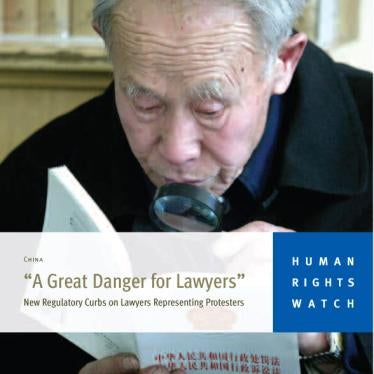(Hong Kong) - China’s annual session of the National People’s Congress (NPC) in Beijing has been marred by increasingly violent crackdowns on protesters, petitioners and rights activists across the country and a surge in house arrests of activists, Human Rights Watch said today.
Protests in Hunan and Guangdong provinces were violently suppressed on March 11 and March 12 respectively. In both cases, specially dispatched riot police attacked the crowds, according to eyewitnesses cited in international news reports. In Beijing, hundreds of petitioners have been rounded up over the past two weeks, in the largest “clean-up” operation by the police in recent years. Dozens of rights activists across the country are being held under house arrest or being so closely monitored that their freedom has been significantly impaired.
“China’s leaders are showing that they are afraid of the views and voices of their own people,” said Brad Adams, Asia director at Human Rights Watch. “If they were confident that they had popular legitimacy, they would not resort to such heavy-handed tactics.”
In Hunan, thousands of demonstrators protesting alleged corruption and collusion by officials were attacked by local police in Yongzhou on March 10. A student was killed and at least 60 protestors were injured, according to the latest reports. The authorities have sealed off the city, making it impossible for independent observers to report on events there.
In a separate incident on March 11, police broke up a protest by approximately 1,000 villagers in Dongzhou in China’s Southern Guangdong province. The villagers, who have been involved in a long-standing land dispute with local officials, reported that they were attacked by large gangs of thugs wielding rocks and sticks. The police were called to the scene, but failed to take any measures against the attackers. More than 20 people have reportedly been injured. Dongzhou was the site of an earlier clash in December 2005, in which police shot and killed at least three protesters and sealed off the city. Authorities have set up checkpoints at the entry of the township.
Human Rights Watch urged the Chinese government to end its use of thugs to break up demonstrations and to ensure that all security forces of any sort adhere to the United Nations Basic Principles on the Use of Force and Firearms by Law Enforcement Officials.
“The use of excessive force by Chinese security officials to break up demonstrations is becoming increasingly common,” said Adams. “The government should instruct its forces to follow the most basic professional standards in policing demonstrations.”
Since the NPC started, a number of prominent rights campaigners have reported being placed under house arrest, including HIV/AIDS activist Li Xige, legal campaigner Liu Feiyue, and relatives and supporters of the imprisoned blind rights activist Chen Guangcheng.
Li Xige’s telephone and internet access were cut off after she issued a public appeal on March 12 to address the situation of HIV/AIDS and blood disease patients in Henan. She is now prohibited from leaving her home. Liu Feiyue, a legal advocate from Hubei, was detained for three days in connection with his work on the behalf of forcibly evicted villagers from Chenggang village, near the city of Suizhou, and is now under house arrest. Relatives and supporters of Chen Guangcheng, who was jailed for four years and three months in December 2006 under trumped-up charges of “damaging public property and gathering people to block traffic,”have reported an increase in harassment and threats from local authorities during the NPC.
Dissidents and independent writers in Beijing have also been subject to an array of restrictive measures during the past two weeks, including warnings from the police not to contact foreign journalists or issue public appeals, suspension of telephone and internet services, increased police surveillance, and house arrest.
“House arrest is becoming the weapon of choice for the authorities in silencing and repressing civil rights activists,” said Adams. “It is imposed at the entire discretion of the police and takes place outside of any legal procedure – you can’t get more arbitrary than that.”
Human Rights Watch said that these latest attacks on freedom of expression and assembly come during an explosion of social unrest in recent years. Problems such as corruption, illegal-land seizures, forced evictions, the forced relocation of entire communities in the name of economic development and modernization, unchecked pollution, and the collapse of the welfare state have become burning social issues. According to official Chinese government statistics, an average of 200 protests take place every day – quadruple the number a decade ago.
Tens of thousands of people travel to the capital every year to lodge petitions with the central authorities in the hope of redressing local abuses. This year, police in Beijing conducted several raids on places where petitioners sleep and meet to keep them from being visible during the NPC or to intercept them when they tried to approach delegates to the NPC. More than 700 petitioners have been detained, many of them forcibly sent back to their home provinces.
The annual meeting of the NPC, when hundreds of provincial delegates gather in Beijing for two weeks, is considered by the authorities as a particularly sensitive time when incidents such as demonstrations or public appeals must be prevented. This year’s NPC was widely seen as a grand rehearsal in public order tactics for two even more important upcoming events: the Communist Party’s 17th Congress in October 2007 and the Olympics Games in 2008.
“If this is how the government is going to deal with dissents before and during the Olympics, it will backfire spectacularly,” said Adams. “The heavy-handed measures we have witnessed in recent weeks are completely out of line with the expected behavior of an Olympic host. They show China as a repressive police state instead of the modern country its leaders hope to portray.”







